It seems we can’t find what you’re looking for. Perhaps searching can help.
Sign Up for newsletter!
Subscribe to get the latest eBook!
Hotline






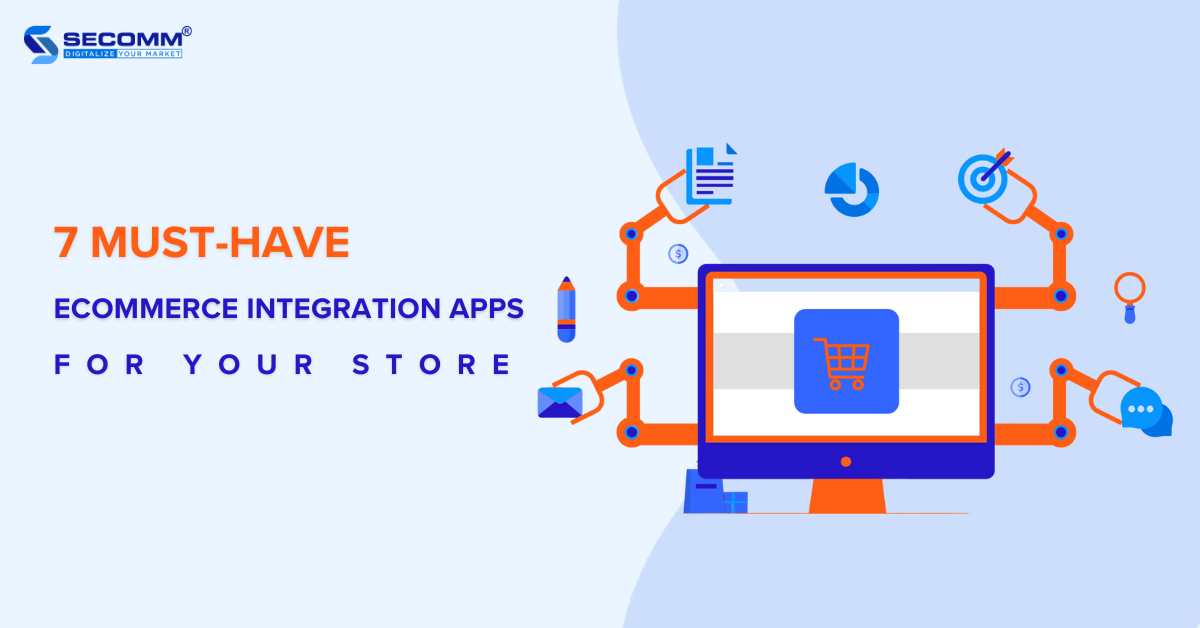
Several crucial factors impact the efficiency of running an online store. Among these, effectively implementing eCommerce integrations plays a key role in helping you streamline your operations and reduce risks.
Below are 7 essential integrations that you should include in your eCommerce website.
PIM (Product Information Management) is one of the common eCommerce integrations. The PIM system is used to collect, organize, and manage product information, including details such as product descriptions, images, prices, product attributes, customer reviews, and ratings.
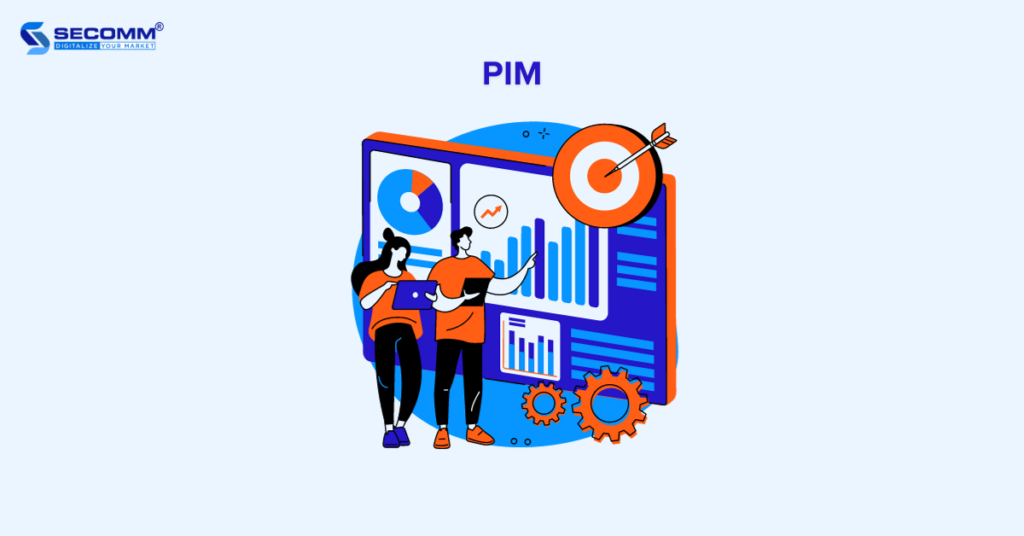
This tool helps you manage product information across diverse platforms, making it easier for customers to choose their desired products. Plus, PIM helps you save time compared to manual data entry, thereby reducing personnel costs.
Take Akeneo PIM, for instance; it is an open-source platform tailored for managing product information effectively. Akeneo is also flexible enough to seamlessly integrate with various systems such as ERP, CRM, POS, and popular eCommerce platforms like Magento, Shopify, and WooCommerce.
Currently, Akeneo offers three main PIM plans, including:
The Order Management System (OMS) helps you process orders in various channels.
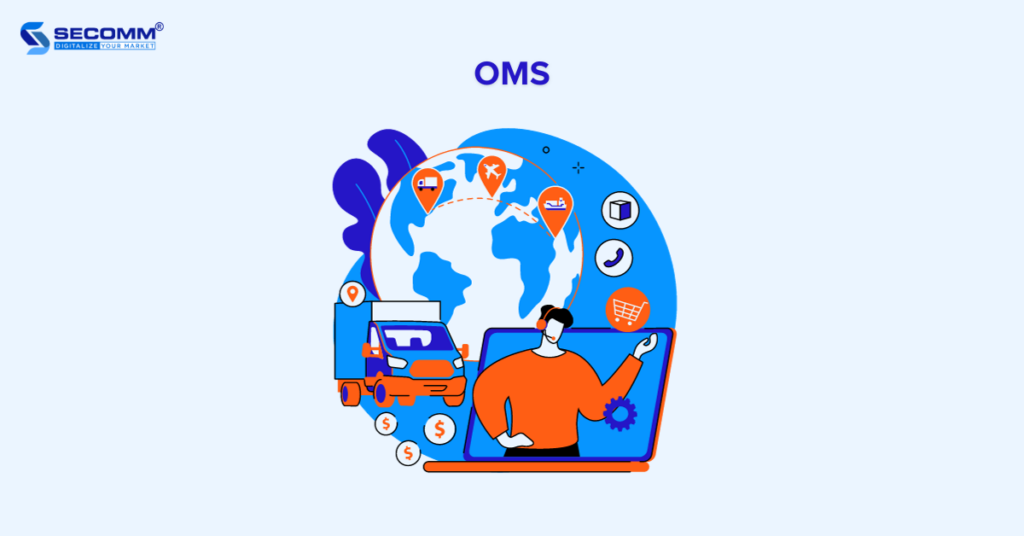
This eCommerce integration not only helps businesses efficiently manage orders, optimizing the customer experience, but also collects and analyzes data at peak and off-peak sales times, as well as for specific orders, top-selling items, and consumer behavior.
So, you’ll easily adjust their business strategies and manage inventory effectively.
For example, Fabric OMS is a Distributed Order Management (DOM) system designed to help you streamline the order processing process, including online purchases at the store (BOPIS), delivery to the store, and in-store order fulfillment.
Fabric’s order management solution helps you integrate and manage the entire order process on a single interface. You can optimize your order processing, minimize inventory discrepancies, and free up resources for other important tasks.
The Warehouse Management System (WMS) will help you manage the flow of goods, inventory, and shipping to facilitate sales and order fulfillment.
By automating order processing and optimizing the layout of goods in the warehouse, WMS accelerates order processing, reduces order preparation time, and enhances the ability to quickly respond to customer demands.
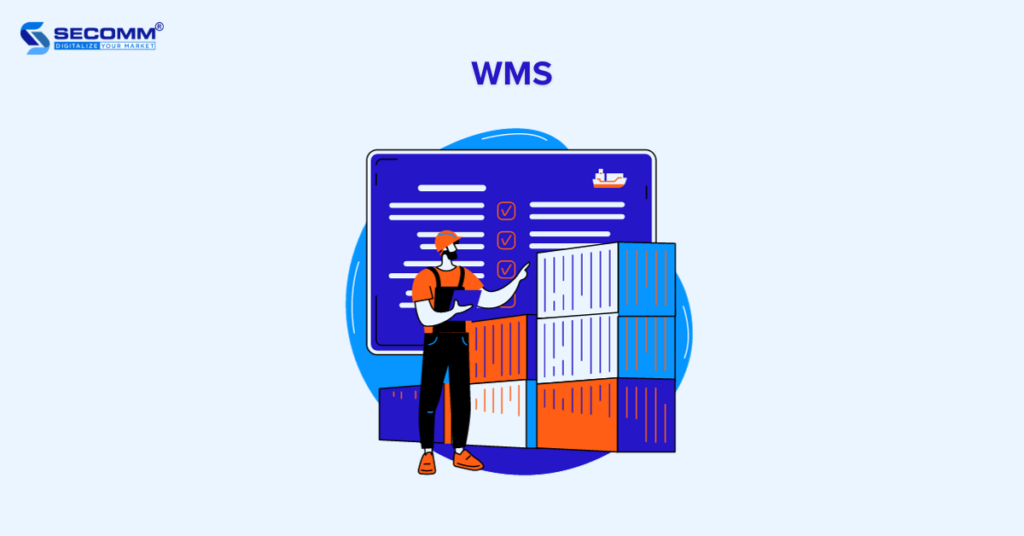
For example, Oracle Warehouse Management Cloud (WMS) is one of the eCommerce integrations that offers a cloud-based warehouse management system. It is well-suited if you’re looking for effective warehouse inventory management.
It automates warehouse processes such as receiving, storage, order processing, and shipping, particularly well-suited for a wide range of business scales. It also seamlessly integrates with ERP, CRM, and other supply chain solutions.
POS (Point of Sale) is a system that includes both hardware and software components, or it can be as straightforward as a point-of-sale device like a computer, tablet, smartphone, or receipt printer.
POS helps you manage and execute sales transactions, calculate payments, generate receipts, manage inventory, handle customer relations, and provide crucial sales-related information.
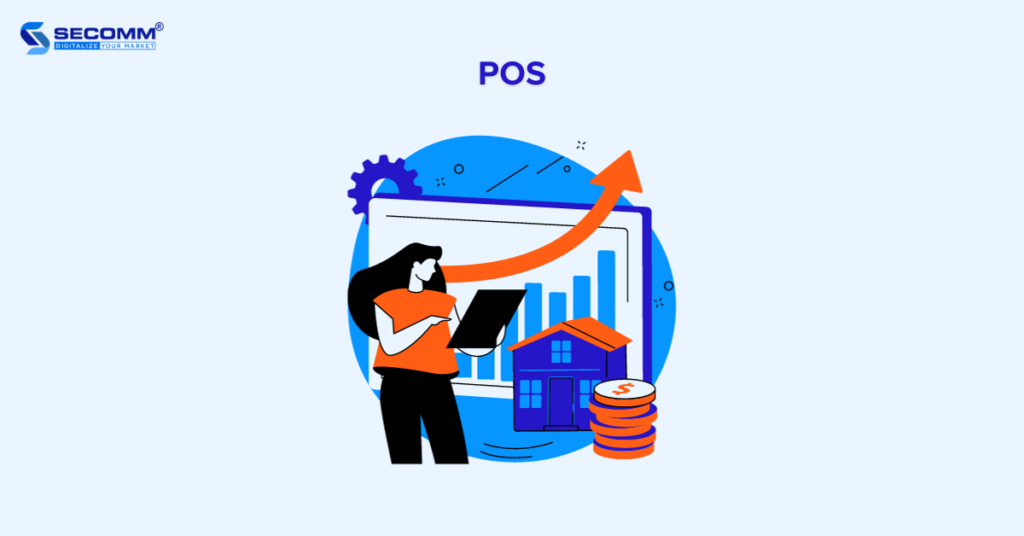
For instance, the Square POS system, developed by Square, has garnered the interest of numerous large businesses globally due to its free features. However, each transaction conducted through the POS incurs a fee of 2.6% and 10 cents for each tap, dip, or swipe.
For the “Buy Now Pay Later” model, the fee is 6% and 30 cents. Additionally, Square provides tailored POS packages for businesses with revenues surpassing $250,000.
Xem thêm:
CRM (Customer Relationship Management) helps you organize and manage customer information, including contact details, purchase history, and interactions. So, you’ll easily tap into customer needs and preferences, optimizing the shopping experience and increasing order conversion rates.
Moreover, CRM allows internal departments to interact and work on a unified and automated system, saving time and costs.
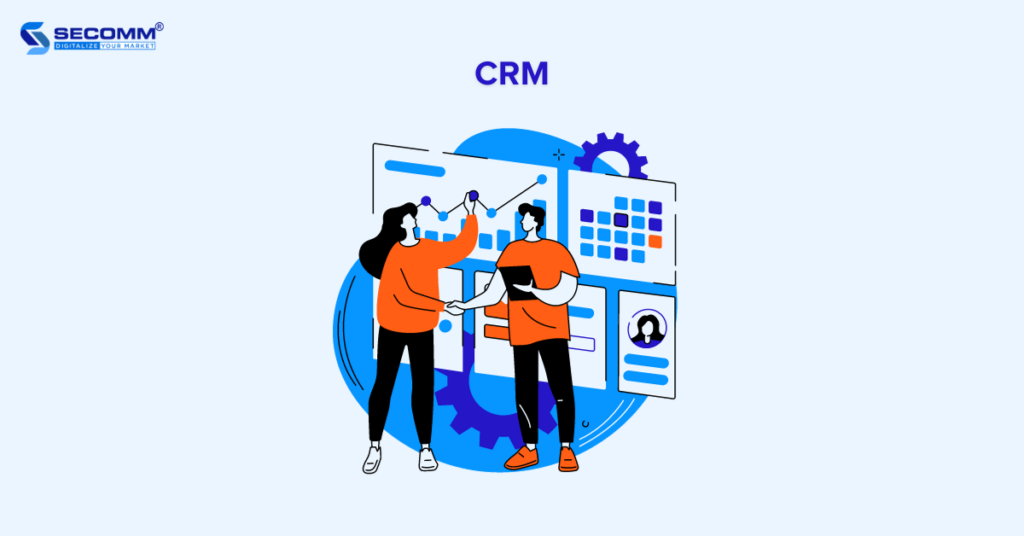
For example, Dynamics 365 Sales is one of the CRMs developed by Microsoft. With its intuitive interface, easy setup, and flexible customization capabilities, you can manage and enhance the efficiency of the sales process.
the system provides a “Real-time Insight” feature to deliver real-time insights from sales calls, such as customer emotions and sentiments. This helps businesses assess and strategize for their sales teams.
Currently, the system offers three plans:
Learn more:
Instead of relying on separate, isolated software systems lacking interdepartmental cohesion, ERP (Enterprise Resource Planning) integrates all software into a unified system.
The ERP eCommerce integration helps you manage all organizational activities, from inventory control and orders to financial planning and customer interactions.
You’ll maximize time efficiency, minimize costs, boost business productivity, and reduce unnecessary workforce.
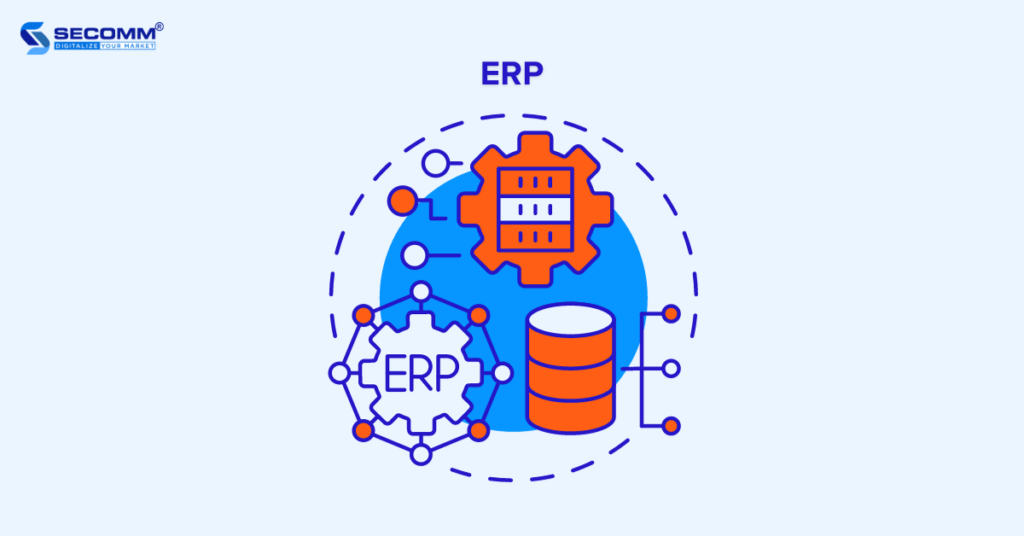
For example, Oracle ERP is one of the top global ERP software known for its outstanding features for operational efficiency.
Currently, Oracle provides three different plans tailored to specific needs:
Learn more: 6 best enterprise ERP software
Business Intelligence (BI) helps you analyze data from various sources such as eCommerce websites, POS systems, CRM, and other data sources. Plus, you’ll gain a deeper understanding of customer behavior, shopping trends, and factors influencing sales performance.
By using BI, you can also predict shopping trends to formulate specific strategies, while simultaneously monitoring financial performance, including forecasting sales figures, profits, and other financial indicators. This helps you allocate resources accurately.
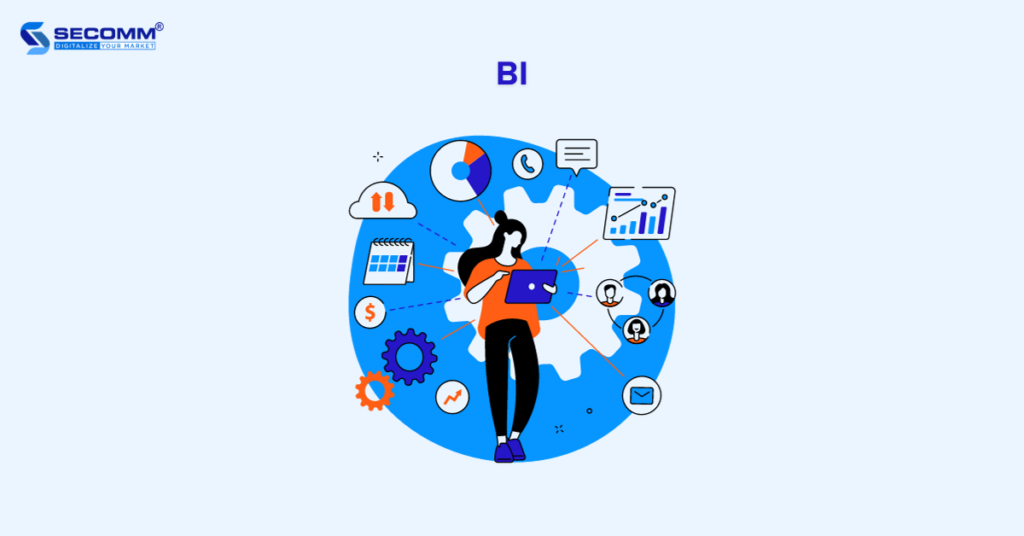
For example, Tableau is a widely used BI tool suitable for various individuals and organizations. With a user-friendly interface that requires minimal technical knowledge, Tableau allows users to easily create reports and visualize data.
The ability to connect and integrate data from various sources, including cloud data, and transform it into visually appealing charts and graphs, makes it easy for users to analyze trends and information
Deploy eCommerce integrations today!
Above are 7 popular eCommerce integrations to build your eCommerce website and enhance your online presence. You’ll choose your best-suited systems depending on the strategy, estimated budget, and business direction.
With profound knowledge of the eCommerce industry and experience in deploying integrations for all sizes of businesses, SECOMM is committed to proposing cost-effective solutions to develop your high-performing eCommerce system.
Contact or call directly on the SECOMM hotline (02871089908) to get started today!
 2
2
 3,552
3,552
 0
0
 1
1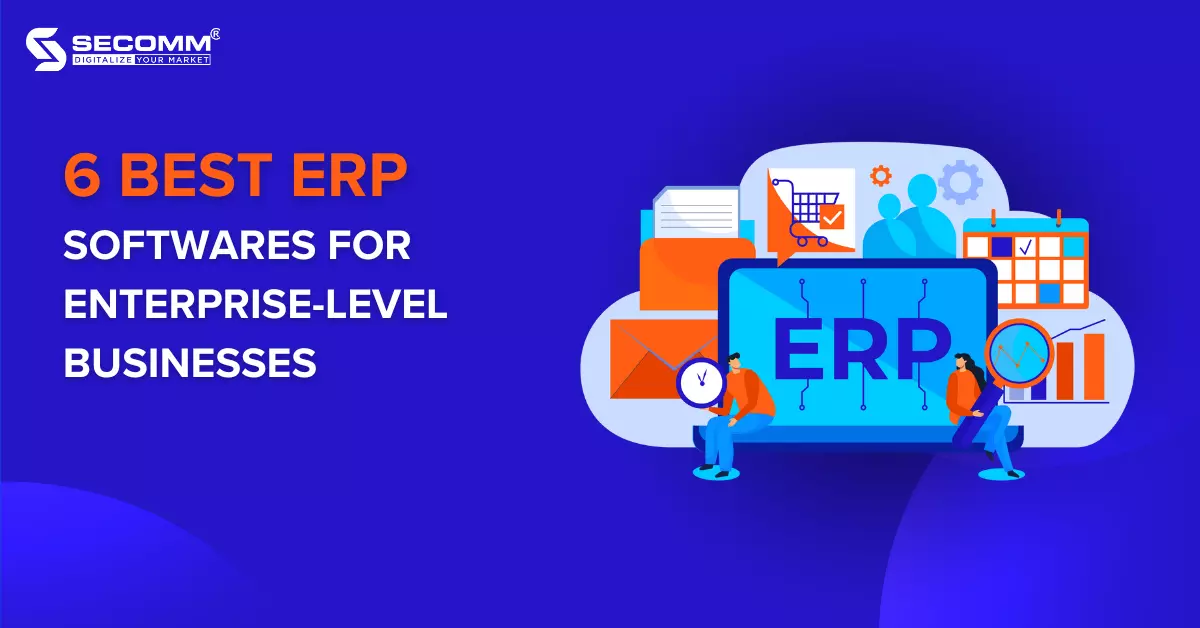
Data holds significant value for eCommerce enterprises across all sizes, yet effectively managing and monitoring it is no simple task. Hence, the advent of ERP software emerges as a superior solution, enabling the amalgamation of all business data into a singular database for seamless accessibility, analysis, and oversight.
Nevertheless, to fully unlock the capabilities of ERP, businesses must opt for software equipped with features aligned with their specific business requirements. Recently, six prominent ERP software solutions are widely adopted by many eCommerce enterprises: Oracle Netsuite, Acumatica, Odoo, Sage x3, SAP S/4 HANA, and Microsoft Dynamics 365.
ERP stands for Enterprise Resource Planning, is a software solution designed to assist businesses in gathering, storing, analyzing, and overseeing all data pertaining to their business operations from diverse internal departments, all within a single database. This data encompasses:
Integrating ERP software into eCommerce operations empowers businesses to centrally manage data originating from multi-channel sales and marketing endeavors, encompassing sources like websites, social media, mobile devices, and brick-and-mortar stores.
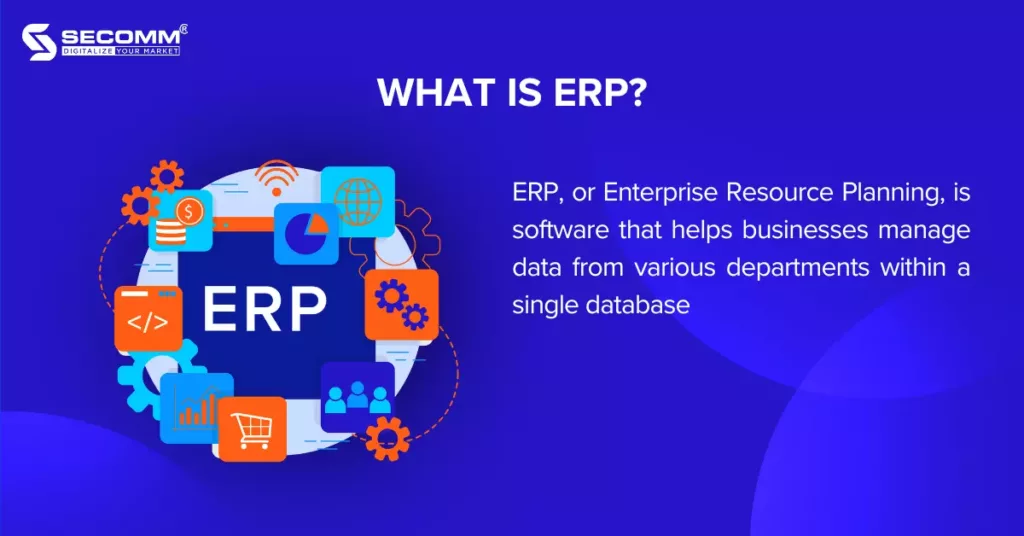
On-premise ERP software, also referred to as ERP in-house, is installed and stored directly on the business’s servers and internal infrastructure. When utilizing on-premise ERP, the business assumes responsibility for managing hardware, IT infrastructure, software updates, and maintenance.
Cloud-based ERP software is supplied, stored, and managed by a third-party provider. This allows users to access it remotely from any device with an internet connection and is also known as Software as a Service (SaaS). In this scenario, the provider takes charge of infrastructure management, encompassing servers, storage, data backups, updates, and software maintenance.
Hybrid ERP software is a combination of both on-premise and cloud-based ERP solutions. In the hybrid ERP model, specific modules of the ERP system are stored on-premise, while others are stored in the cloud. This approach enables businesses to leverage advantages from both software models. For instance, critical data or modules can be kept on-premise for control and heightened security, whereas less critical data or modules can be hosted in the cloud for effortless accessibility and future expansion.
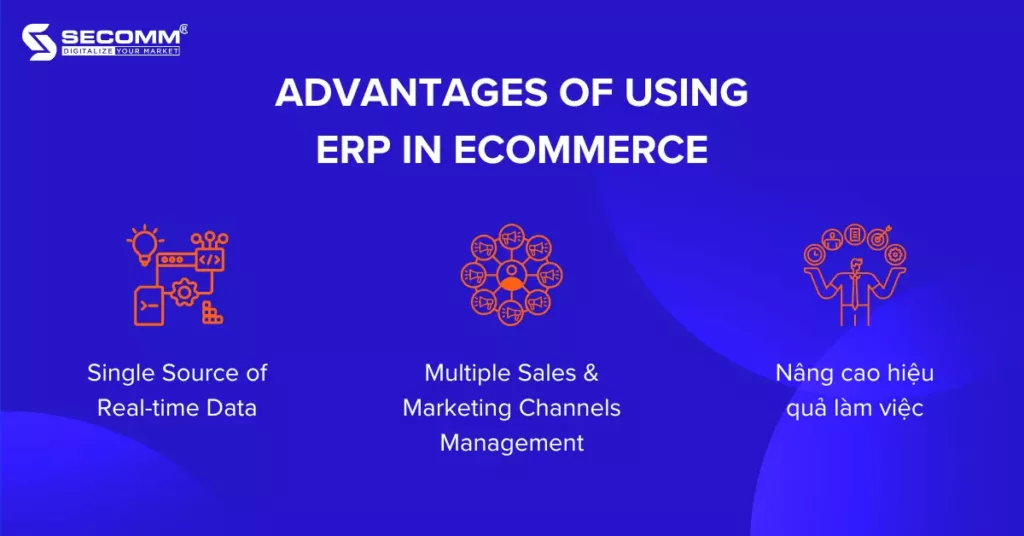
One notable advantage of ERP software is its real-time integration capability, which consolidates diverse departmental data into a unified database. This consistency streamlines data management, especially considering the substantial volume of data that eCommerce businesses accumulate daily, much of which pertains to purchasing behavior.
As a result, when integrating this data with other business information, enterprises can uncover and implement distinctive approaches to:
For instance, ERP software provides businesses with reports encompassing details about best-selling products, canceled orders, recurring customer lists, cart abandonment rates, interactions with social media posts, and more. In turn, businesses can amalgamate all this data within a shared database to gain a holistic perspective of the current landscape and swiftly make pertinent adjustments for eCommerce expansion.
eCommerce enterprises employing a variety of channels in their sales and marketing strategy will likely need to evaluate sales performance and engagement levels across each channel to gauge their efficacy. ERP software assists businesses in concurrently managing sales channels within a centralized database.
Through analyzing integrated ERP data from various channels, encompassing social media, websites, mobile apps, eCommerce platforms, and more, enterprises can understand why one sales channel surpasses others and determine which marketing campaigns yield favorable conversions and which ones require enhancement.
Insufficiently integrated business data can lead to difficulties in accessing accurate and updated information. This may compel businesses to manually input extensive data, potentially resulting in errors.
Conversely, the use of ERP can facilitate nearly impeccable automated data entry. Moreover, this software supports other automated processes, like invoice generation and marketing campaign automation, among others. This frees businesses from monotonous manual tasks, enabling them to concentrate on pivotal tasks that enhance revenue.
Oracle NetSuite serves as a cloud-based ERP solution, delivering a comprehensive set of tools for effectively managing business operations. This software empowers eCommerce enterprises to automate functions across multiple domains, including sales management, marketing, customer relations, financial control, inventory management, and more.
What sets Oracle NetSuite apart is its adaptability and scalability, catering to businesses of various scales and industries. It streamlines eCommerce workflows while enhancing operational efficiency, all facilitated by real-time insights available through a unified dashboard.
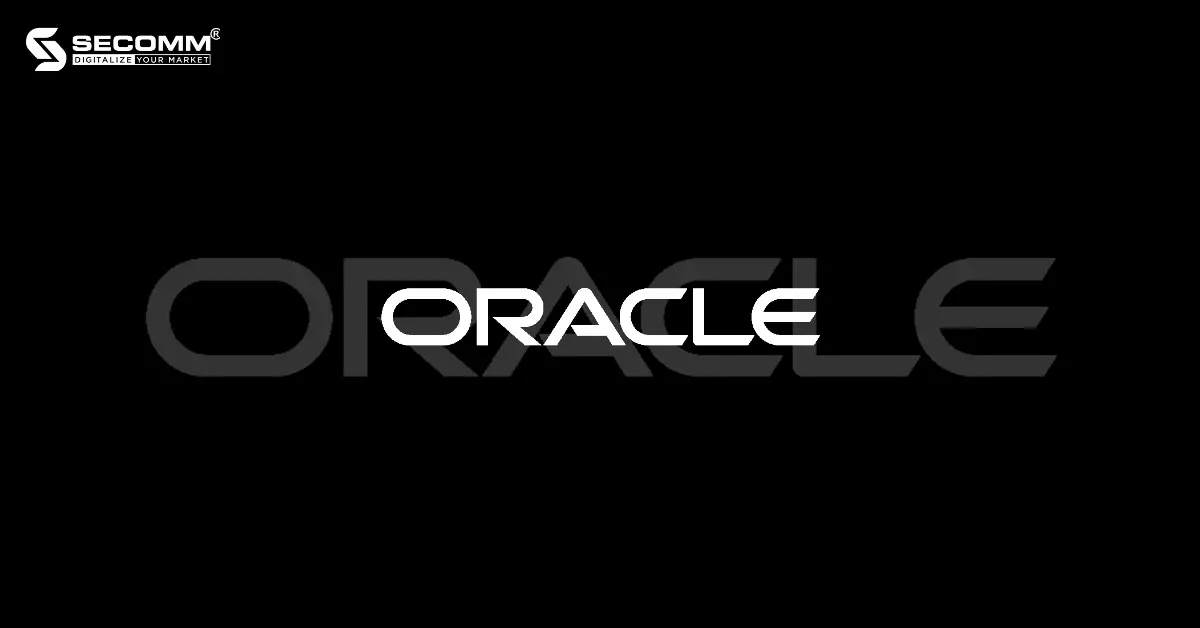
Key features of Oracle NetSuite encompass:
Pros:
Cons:
Cost: Estimated deployment costs for Oracle NetSuite can commence at $10,000. Nevertheless, this is not a fixed price and will be tailored according to each business’s specific deployment requirements.
Acumatica stands as a cloud-based ERP software designed to cater to businesses of all sizes, particularly those in rapid development. It offers adaptable cloud storage alternatives, including both public and private clouds, ensuring convenient access and secure handling of business data.

Prominent features of Acumatica including
Pros:
Cons:
Cost: Estimated costs for deploying Acumatica can range from $15,000 to $40,000 per year. However, this is not a fixed price and will be customized based on the specific deployment needs of each business.
Odoo is an open-source ERP software in a modular form that can be customized to support businesses in efficiently managing various aspects of their operations, such as customer relationship management (CRM), accounting, inventory management, and more. Odoo provides an optimal solution for businesses of all sizes and industries.
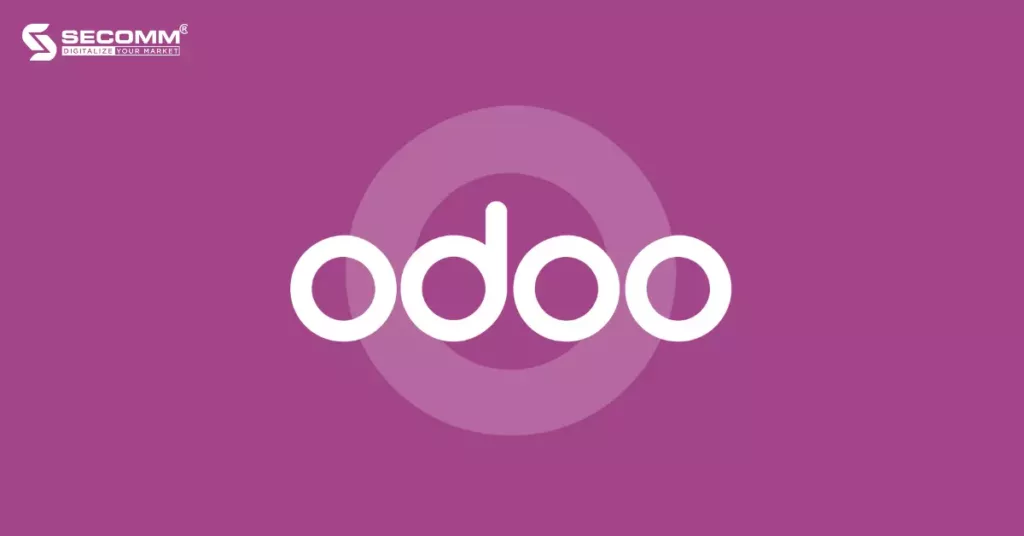
Key Features of Odoo:
Odoo offers a comprehensive set of features and modules ranging from basic to advanced, catering to all business operational needs in eCommerce. It stands out with the following features:
Pros:
Cons:
Cost: Businesses receive free usage if they utilize only a single module and there’s no restriction on the number of users. However, if a business uses two or more modules, the pricing structure is determined based on:
Sage X3 is a hybrid ERP software solution designed to meet the needs of medium-sized and large enterprises in managing and operating business activities across multiple locations or countries.

Key features of Sage X3:
Sage X3 offers a range of features from basic to advanced to support business management and operations processes, with a focus on product management, supply chain management, and financial management.
Pros:
Cons:
Cost: Estimated implementation costs for Sage ERP can commence at $128,000. However, this figure is not fixed and will be adjusted based on the unique deployment requirements of each business.
SAP S/4 HANA (High-Performance Analytic Appliance) is a leading hybrid ERP software designed for large-scale enterprises. SAP S/4 HANA is considered the next-generation comprehensive ERP solution by SAP, incorporating artificial intelligence technology. It is designed to optimize business processes, cater to specific industry requirements, and support decision-making processes. The software offers solutions in financial management, supply chain management, sales management, customer relationship management, and more.
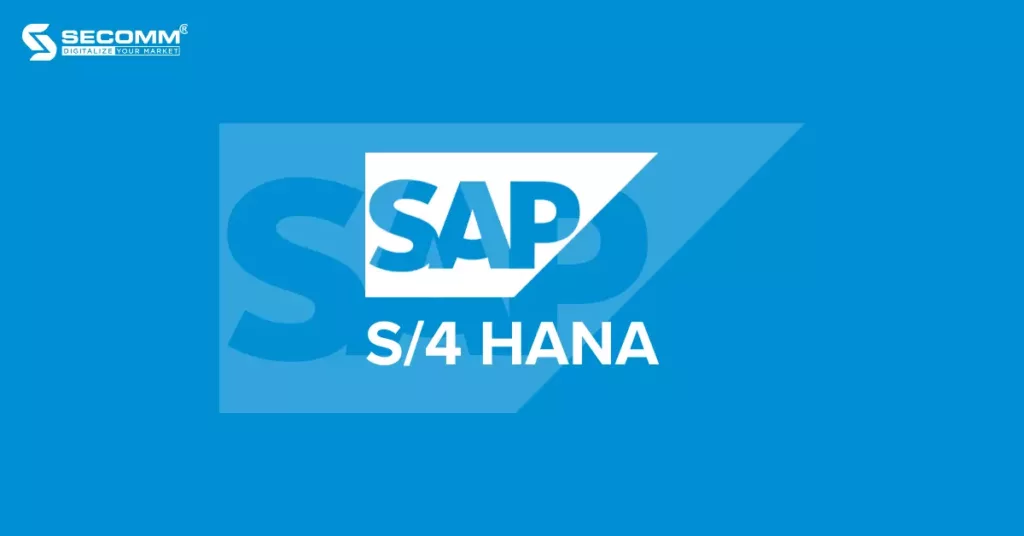
Key Features of SAP S/4 HANA:
Pros:
Cons:
Cost: The pricing details for SAP S/4 HANA are not publicly disclosed, though businesses can access a 30-day free trial with certain feature limitations.
Microsoft Dynamics 365 software stands out as a superior hybrid ERP solution tailored for large enterprises. Depending on individual business needs, the ERP system can seamlessly integrate with diverse Microsoft applications to optimize various aspects of business operations, including sales, inventory, and financial management. Microsoft Dynamics 365 is well-equipped to provide effective support for numerous industries such as manufacturing, financial services, healthcare, eCommerce, and more.
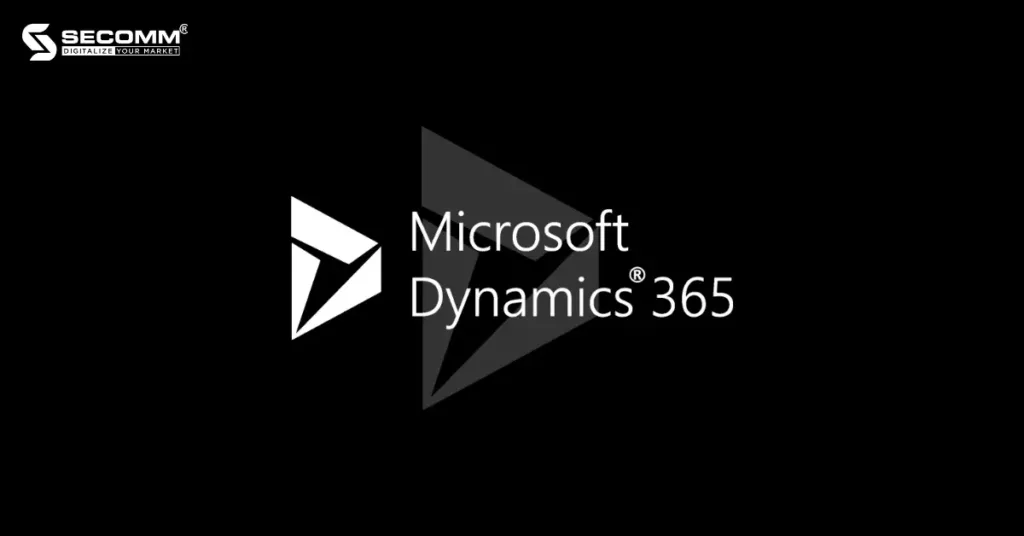
Key Features:
Pros:
Cons:
Cost:
Businesses can avail of a free 30-day trial of Microsoft Dynamics 365. Depending on the module, the software offers two pricing categories:
Subsequent pricing is applicable solely to individuals licensed to utilize the first app.
As an example, in the Financial Management module:
For detailed pricing information on other modules, businesses can refer to Microsoft Dynamics 365’s pricing page.
The aforementioned is a summary of 6 eCommerce ERP software options tailored for large-scale businesses, showcasing their unique features and respective strengths and weaknesses.
To gain a more comprehensive insight into ERPs and to select the ERP software that best suits your business requirements, contact SECOMM or call the SECOMM Hotline (02871089908) for a free consultation.
 2
2
 10,192
10,192
 0
0
 1
1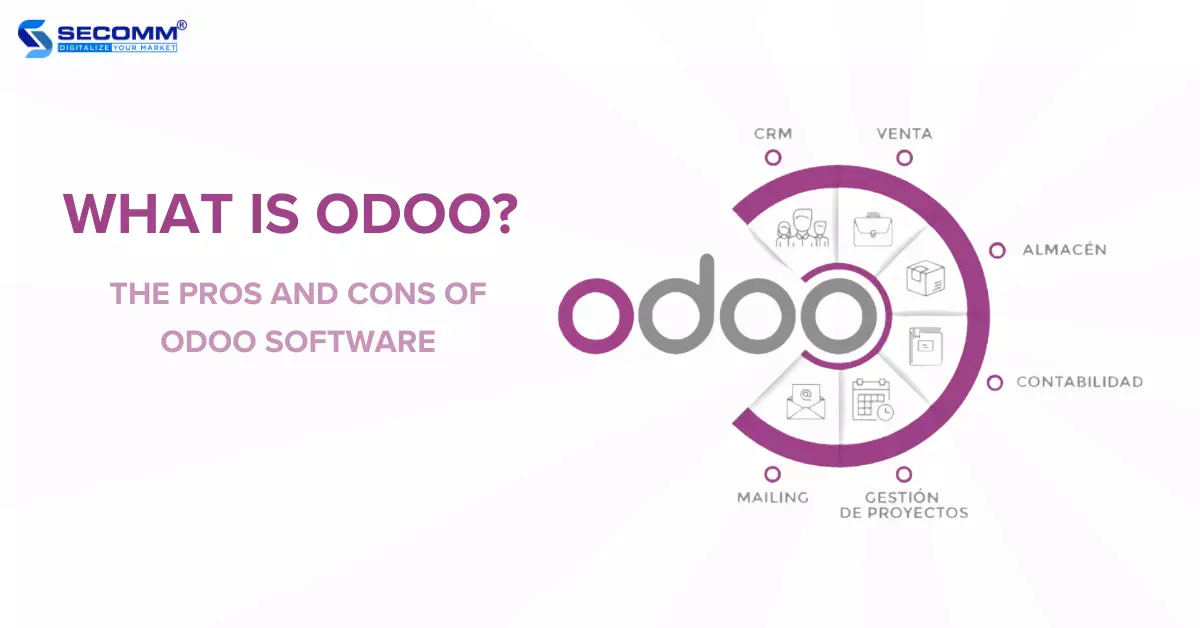
In today’s landscape, ERP software plays a pivotal role in the efficient management and operation of eCommerce activities. Among them, Odoo ERP stands out as pre-configured management software, tailor-made for businesses for easy downloading and utilization, providing a range of solutions to support various business facets like sales, marketing, inventory, customer service, and more. The subsequent article aims to elucidate the concept of Odoo ERP and delve into its strengths and weaknesses when integrated within enterprises.
Odoo, also known as Odoo ERP and previously called OpenERP, is a versatile open-source business management software. It comes with complete integration and customization capabilities, catering to offer a comprehensive solution for overseeing diverse facets of eCommerce operations.
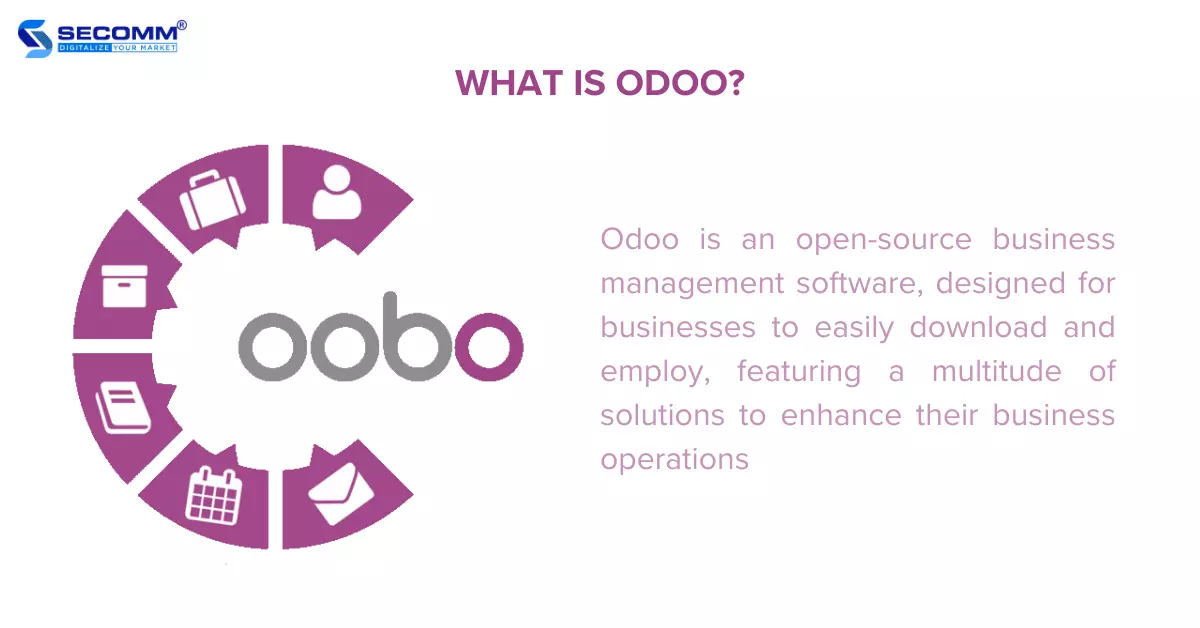
Among its noteworthy functionalities are sales and marketing management, customer relations, project oversight, manufacturing, inventory control, accounting, human resource administration, customer service handling, and a plethora of other applications. As a result, Odoo is adept at fulfilling the real-world business requirements of enterprises spanning all sizes and budget ranges, across many industries.
There are various editions of the Odoo software, with the most recent being Odoo 16; additionally, Odoo 17 is anticipated for release towards the end of 2023. With respect to version 16, the development team has incorporated numerous features and tools to bolster business efficiency, concurrently concentrating on refining a host of existing attributes. Odoo 16 stands as a source of pride, being the swiftest, most visually appealing, and intuitively designed version.
The Odoo management software is available in two primary editions that every business should thoroughly explore before implementation.
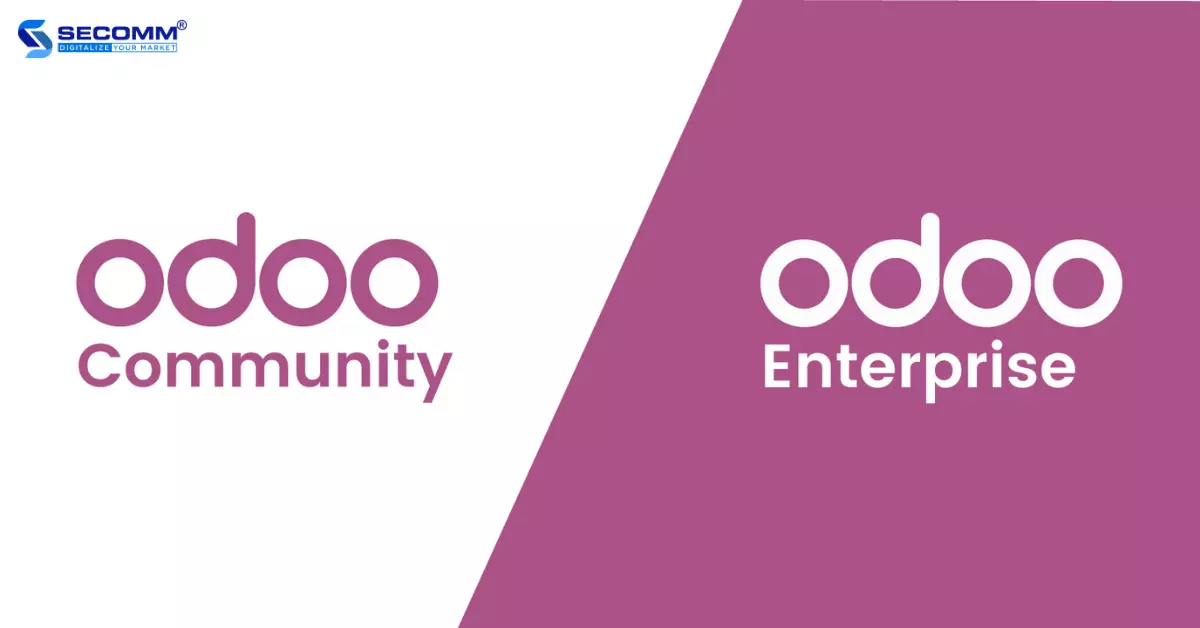
This version of Odoo is free for users to download and use. The Odoo Community edition offers a wide range of features and modules that support essential business operations such as sales management, marketing, customer relationship management, inventory management, accounting, and more.
The Odoo Enterprise edition is a premium, paid version with multiple editions tailored to businesses of all sizes. The Enterprise edition is designed to provide advanced features and modules that enhance operational workflows. The cost of the Odoo Enterprise edition is determined by five factors: the number of users, the number of utilized apps, hosting type, deployment services, and integration with third-party systems.
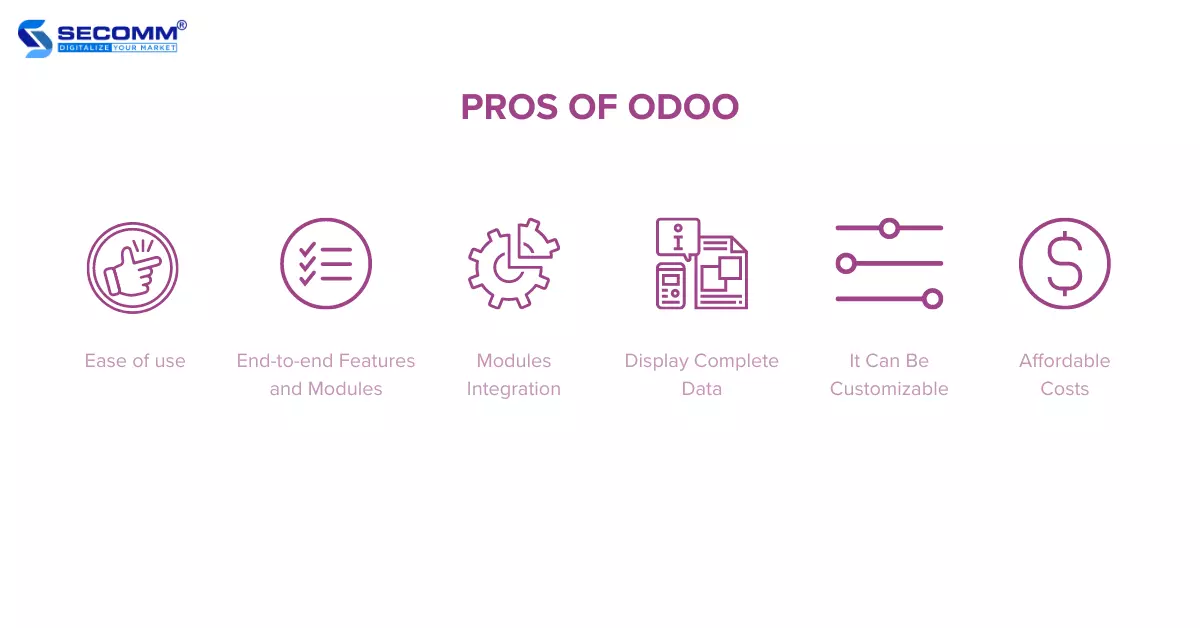
The Odoo interface boasts a simple and intuitive design, with modules logically and systematically organized. As a result, new users will quickly become proficient without investing an excessive amount of time.
Odoo offers an expansive array of features and modules, spanning from fundamental to advanced, to address all requirements for effective business management and operations. These encompass tasks such as sales management, marketing, customer support, accounting, inventory control, and manufacturing.
As businesses embark on Odoo implementation, they can initially utilize the complimentary Community edition and subsequently migrate to the paid Enterprise edition, unlocking the full spectrum of capabilities, modules, services, and progressive enhancements.
Previously, businesses used to store information and data within individual department databases, leading to challenges in accessing and sharing information across departments. With Odoo, apart from providing the necessary modules for management and operations, it also aids businesses by integrating and storing data from all departments in a unified database, facilitating quicker and more convenient management and tracking.
Besides storage and integration, Odoo also holds the advantage of presenting comprehensive information. For instance, the ability to showcase detailed and complete data assists businesses in effectively managing product inventory levels on a daily or monthly basis, encompassing future shipments that have not yet been recorded.
Moreover, businesses can better control working capital by gaining insight into their inventory status. Furthermore, the availability of all information in a unified database fosters collaboration and streamlines the accomplishment of complex tasks. This results in improved workflow processes, enabling businesses to effortlessly monitor interdepartmental processes with efficiency.
Another benefit of Odoo software pertains to its customization potential. Odoo allows users to tailor the software to their requirements without the necessity of writing code. Thanks to its intuitive and user-friendly interface, individuals without extensive programming skills can also make adjustments.
Comparatively, the cost of utilizing Odoo is quite reasonable in comparison to other ERPs. For businesses with a single function requirement, there is no charge for using Odoo, allowing for long-term usage. However, when utilizing two or more functions, businesses receive a 15-day trial period, followed by a moderately priced subscription.
Costs escalate further if the customization and programming of additional modules are aligned with the business’s direction are required. If a business possesses an internal team to perform these tasks, the development costs can be avoided. In practice, businesses will need to seek support from specialized Odoo experts.
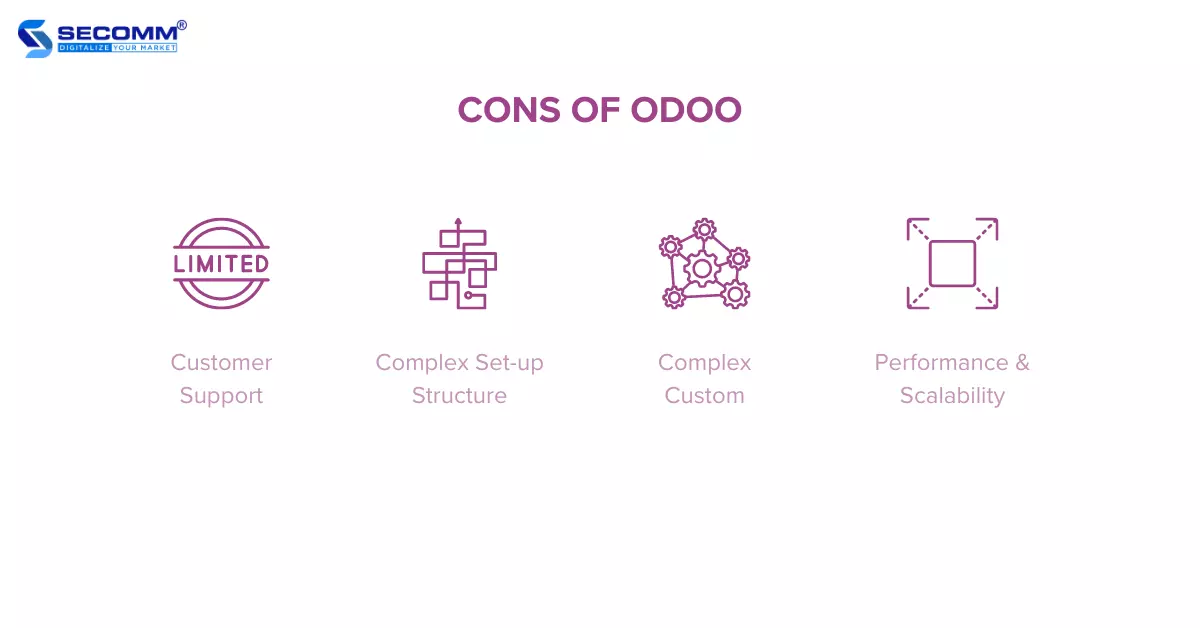
Because of constrained resources and a vast user base, Odoo is unable to offer top-notch customer support to every client. Certain customers have found themselves dissatisfied as their concerns weren’t entirely resolved during their initial support interactions. Furthermore, the cost of Odoo training is quite substantial, rendering it unfeasible for small businesses to establish a specialized Odoo support team.
Much like other present-day ERP software, Odoo’s structure can pose difficulties during the initial setup for businesses adopting it for the first time. This can result in a time-consuming and effort-intensive process of addressing setup-related issues
While Odoo provides numerous built-in functionalities, being a universal ERP solution for diverse business models worldwide means that adapting Odoo to a particular business type or a specific country requires customization.
Odoo does offer customization options, but for highly specific or complex customization requirements, it might necessitate developers with extensive technical expertise and experience. This could potentially lead to extra costs for customization and overall maintenance.
Although Odoo can meet the deployment requirements for a variety of business scales, its performance, and scalability may raise considerations for larger enterprises with substantial transaction volumes. Hence, businesses should strategize their development and assess scalability aspects prior to choosing, ensuring effective operations.
With many years of eCommerce deployment and integration of various ERP systems for numerous global enterprises, SECOMM comprehends the challenges businesses face when implementing the Odoo ERP system.
Contact SECOMM or call the Hotline (02871089908) now to receive consultation on Odoo implementation.
 2
2
 14,067
14,067
 0
0
 1
1Subscribe to get the latest eBook!
Hotline